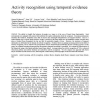Free Online Productivity Tools
i2Speak
i2Symbol
i2OCR
iTex2Img
iWeb2Print
iWeb2Shot
i2Type
iPdf2Split
iPdf2Merge
i2Bopomofo
i2Arabic
i2Style
i2Image
i2PDF
iLatex2Rtf
Sci2ools
140
Voted
JAISE
2010
2010
Activity recognition using temporal evidence theory
The ability to identify the behavior of people in a home is at the core of Smart Home functionality. Such environments are equipped with sensors that unobtrusively capture information about the occupants. Reasoning mechanisms transform the technical, frequently noisy data of sensors into meaningful interpretations of occupant activities. Time is a natural human way to reason place at distinct times throughout the day and last for predicable lengths of time. However, the inclusion of temporal information is still limited in the domain of activity recognition. Evidence theory is gaining increasing interest in the field of activity recognition, and is suited to the incorporation of time related domain knowledge into the reasoning process. In this paper, an evidential reasoning framework that incorporates temporal knowledge is presented. We evaluate the effectiveness of the framework using a third party published smart home dataset. An improvement in activity recognition of 70% is achieved...
Related Content
| Added | 19 May 2011 |
| Updated | 19 May 2011 |
| Type | Journal |
| Year | 2010 |
| Where | JAISE |
| Authors | Susan McKeever, Juan Ye, Lorcan Coyle, Chris Bleakley, Simon Dobson |
Comments (0)

